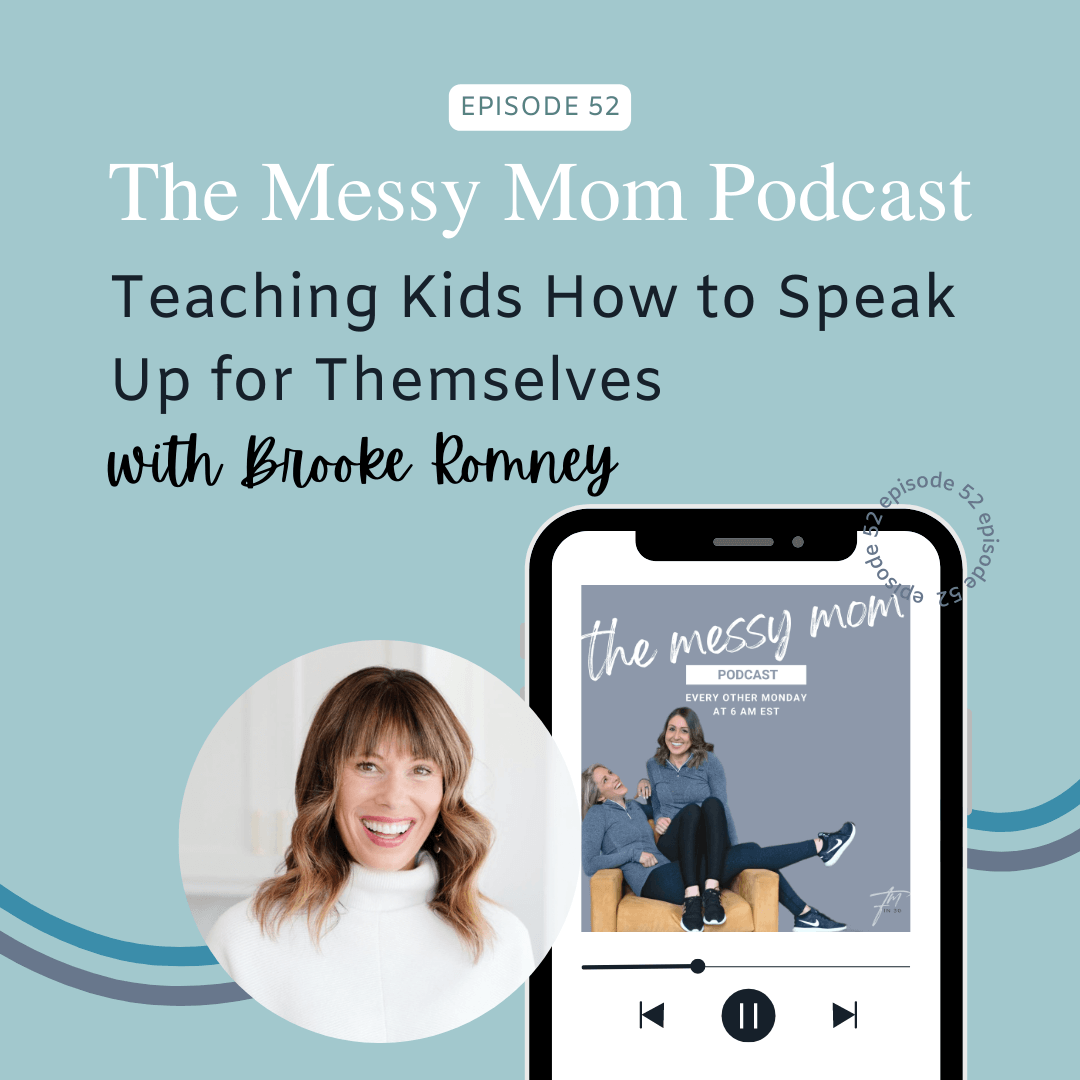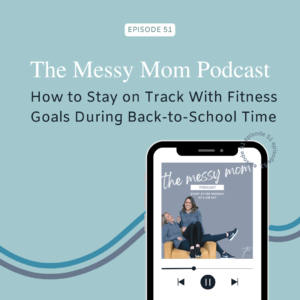CLICK PLAY TO LISTEN TO TEACHING KIDS HOW TO SPEAK UP FOR THEMSELVES:
Teaching Kids How to Speak Up for Themselves
Hey there, welcome to another episode of the Messy Mom podcast! But this time it’s a little different because it’s the first episode in our new parenting series. Over the next few episodes, we’re going to have a guest that dives into helpful parenting tips, tricks, or a certain niche that is going to benefit you or a friend in some way.
To start us off, today we have an amazing guest on the show, Brooke Romney. Who talks about a topic that we think is really important – how to teach your kids how to stand up for themselves. And at a young age so that they can learn to be more confident, connected, and other valuable qualities.
Her goal is to help parents alleviate stress by offering tips and tricks to make every family feel more confident, connected, and that they are not all in it by themselves. As a mom to four boys aged 11 to 20, Brooke wears multiple hats. She is a writer, with her fourth book coming out in September, and a community builder for parents online seeking inspiration and support.
We also think it’s perfect timing with the back-to-school season. As parents, our thoughts often revolve around the moments when our children are away from us. We find ourselves wondering: How are they? Are they standing up for themselves? Are they being decent human beings? And, how do we teach them that?
So, join us to hear Brooke’s practical tips on how to teach them those skills at home!
Teaching Kids to Stand Up for Themselves
When we first got in touch with Brooke one of the topics that really stood out for Cari is teaching kids how to speak up for themselves. Especially now that we are in back-to-school motion, it is something for her that is one of the most important things she wants to teach her kids. So, our first question was what advice does she have or where can we start to teach kids the skill or the technique on how to speak up for themselves?
Brooke starts off with a little bit of mindset. She says, “As parents, we really want our kids to have self-confidence. And a lot of times, we forget that part of that is self. It’s not something that a parent can give to their child by telling them over and over how awesome, special, important, or talented they are. It’s something that our kids have to feel for themselves. And I think by teaching them to speak for themselves, they’re able to gain confidence at really young ages.”
But this can be hard, for example, she is a talker so she wants to jump in all the time and answer all the questions. But she thinks we can start this really early on and very simply. For instance, when someone is asking a question either to them or about them, we give our kids the opportunity to answer for themselves. So, when you’re at ‘back-to-school night’ and the teacher says, “What do you like to do?” Especially if your kid is shy or a little hesitant, it’s so easy for us to say, “Oh, you know, they love soccer and they love painting.” However, really give our kids that opportunity to answer for themselves – whether it’s at school, with a doctor, or a grandparent. And sometimes that means being willing to wait, be encouraging, and saying, “You know what you love, go ahead and tell them what you love.”
She also really loves teaching kids from a very early age to introduce themselves. It’s really easy to go into a new situation and feel very alone. But if you start with the skill of introducing yourself, you will have very few lonely moments. As she points out, “The kids who start early, like by five years old, they’re walking into kindergarten and they’re saying, ‘Hey, I’m Brooke. I haven’t met you yet. What’s your name?’ It just becomes a habit.” Those kids develop a lot of confidence in being able to speak for themselves.
We really love that and Cari added that she feels there are a lot of books out there that are all positive (which is great) but it doesn’t matter how many times someone says, “Your this, you’re that” if you haven’t figured it out for yourself, it’s never going to stick.
Brooke agrees and thinks it is especially true as our kids grow up and grow older. You might believe your mom when you’re five, but then all of a sudden you’re 8 or 10 and you’re like, “Well, they say I’m great, but nobody wants to play with me or nobody wants to include me.” So, really helping our kids be able to advocate for themselves, introduce themselves, and find a new friend.
Another thing that she really loves to encourage parents is that when you’re praising your kids, you’re praising them for who they are on the inside, not for what they’re doing on the outside. So, if you have a child who draws you a picture instead of saying, “Oh, you draw the best pictures.” You say, “Wow, you’re very creative” and creativity is something that they take in. It doesn’t matter if their picture is horrible or not as good as their friend’s picture in art class – they’re creative. This creates kids who are more confident on the outside and able to speak for themselves because they like themselves, they understand their values, and they understand who they are.
Teaching Kids to Stand Up for Others
Along those same lines, we wanted to know what tips she has for teaching kids how to stand up for other people, especially when other kids might be mean. And how does she recommend us to go about that?
This one can be a little tricky because every situation is a little bit different. But there’s a phrase that she really loves, and it’s called being an upstander. So, instead of being a bystander where you’re just watching things happen, you are an upstander. This means that you’re someone who is willing to stand up for the person who people are being unkind to or hurting.
She thinks it’s also important that we let our kids know that if they don’t feel safe or comfortable doing that, going to get an adult is a really great option and still very helpful. All of our kids are going to be a little different. Some of them are going to be willing to jump into the fray and stand up for someone while others are going to be a little hesitant. But helping our kids know that they still can have the power to improve a situation whether that’s saying, “Hey, knock it off or that’s not nice” or it’s running to go get the teacher, the ground duty, or someone that can help.
She also loves giving her kids phrases that can help them, especially in times when people are gossiping. This is something that happens a lot, it happens at young ages and at older ages, but giving your kids a few key phrases that can help them when they do get in these situations. She is a huge fan of role-playing a scenario. So, if all of their friends are together and talking unkindly about a girl who is one of their friends, here are a few things you can say like, “Oh really? I like her.” And usually, that can stop the conversation because a lot of times our kids know what’s right, they just don’t know how to verbalize it.
She loves having little go-to dialogues that they can have in their brains that make it easy for them so they know what to say in a tricky or difficult situation.
Then making sure that our kids know that we don’t expect them to be adults yet. They don’t have to have it right every single time. They can come to us if they didn’t know what to do, be able to open that conversation with our kids, and give them some suggestions on what to try because they know their friends and situations better than we do. Sometimes working together can be really helpful.
When to Start Having These Conversations With Your Kids
We love this but we were curious, what age does she think you should start having these conversations or is it just situational?
Brooke does think every kid is a little different because everyone grows and matures differently. Some kids are very oblivious, they’re very welcoming from the very beginning and that’s just part of their personality. Others feel rather exclusive fairly early and they only want one friend. Or they want to be the best or the one that everyone wants to have as their friend. So, she does think it’s really situational, but she thinks as parents, as long as we’re paying close attention and clued in, and not in a let me micromanage every single relationship/hovering way because she feels it’s very important for our kids to have moments away from us where they’re figuring things out on their own and saying, “Oh, wow, that didn’t work very well or now everyone’s mad at me because I told Mia she couldn’t come.” They need to have those opportunities also.
But when we see something, talking about a few gentle options is a great approach. She loves the phrase, ‘I’m noticing.’ So, for example, “Hey, I’m noticing that you don’t want to have John come anymore when you’re having a play date or whatever. Is there a reason for that?”
And maybe there’s no reason, he’s like, “No, I just didn’t think of him.” Oh, great, then let’s include him next time. Or maybe there is a reason he says, “Oh yeah, he actually doesn’t like to play with us anymore. He has five new friends.” Okay, cool. Or maybe it’s, “Well, he said something rude to me and I don’t want to be his friend anymore.” And then you can kind of dive into that conversation. So, really seeing what’s going on and making it less about a lecture and more about, “Let’s talk about this. Let’s figure this out.” We’re here to solve problems with each other and make sure they feel included in that.
Bragging versus Sharing
Another thing that comes up a lot for Cari’s kids’ age is bragging versus sharing. Are we sharing because you’re excited or are we bragging because someone’s not invited?
Brooke loves that she brought this up because it’s actually one of the manners that she has in her new book. She thinks young kids especially, do get excited and it’s really helpful for them to just self-reflect about why they’re sharing it.
We don’t want someone to feel like they can’t share happy, good, or exciting things in their life. But we also have to remind them of why they’re doing it. If they’re doing it to one-up somebody, to sound better, or if they’re doing it to put someone else down, then that’s something to reflect on.
Then she also loves to remind kids that age, we also have to make sure we’re creating spaces for other people to share their happy things too. So if you are someone who’s constantly dominating by how awesome your life is, make sure that you’re taking a backseat and also praising others, giving them the chance to share how great theirs is.
It’s a very tricky thing, but make sure you’re not putting other people down in order to feel better about yourself.
Teaching Kids to Be Respectful of Others’ Values while Standing Firm in Theirs
Another topic that’s been coming up a lot in Cari’s experience, especially as her children mature, is trying to teach them the balance between showing respect towards teachers and parents, while also not being afraid to question things. For example, there are things we do here, like we don’t say God’s name in vain. So, how can we teach them we can stand proud for our morals and ask questions, even if it’s the authoritative figure, saying, “No, this is what we do.”
Brooke thinks this is such a good question. It can be really hard, especially with young kids, because their life is very black-and-white. Which is why we teach a lot of things to them in black and white. But as they get a little older, she thinks those are things that we can talk about. So for instance, she loves reminding her kids that they can advocate for themselves at school, which means doing it respectfully. In her books, she always says that there’s a “why” which is a “What’s in it for me.” Because people will listen to you better when you’re not attacking them.
For example, if you got your test back and you thought there was a question that you should have gotten right, absolutely advocate for yourself. Take it up to the teacher and instead of saying, “You marked this wrong and it’s right” you can say, “Hey could you help me understand why this is wrong? It looked right to me.” And as you give your kids a couple of those options you can say…
- Which one makes you want to help someone?
- Which one makes you want to feel like you’re on that person’s team?
- Which one opens the door for connection?
- Which one makes you like that person more?
- Which one makes you want to listen better?
If your kids are old enough, giving a few of those examples of, “Okay, if this happens at school, or let’s say your teacher says…” She thinks what our kids can start understanding is most adults really want to engage with and help kids when it’s done respectfully. And most adults get very defensive and often frustrated when it’s not done that way. So if they want a better chance at getting their way more often, then they can approach adults respectfully.
The other example is the one Cari gave, which is taking God’s name in vain. So one of the things Brooke loves to remind her kids is the only people that we can control is ourselves. She says, “We really need to only worry about ourselves. And so as we work on saying, ‘I want to make sure that that’s not something I do. That’s not my family’s values, right? Those aren’t my values. So I’m gonna really work on that.’ And when someone else does that, ‘I can wish they wouldn’t, or I can hope they won’t, but I can’t really control that person.’ There’s a few times when we’re gonna have to change that, if somebody’s hurting someone, ruining property, or things that are very serious, but otherwise we need to be okay with the fact that we have different values than someone else has, and we can both be respectful of each other.”
Sometimes when she is talking to her kids about something like that, she’ll say, “Aren’t we always grateful when people are respectful of our values, when they don’t try to change our values, and when they’re respectful of the fact that this is the way we do things, and we need to, in turn, give respect to other people in order to do things the way they think is important.”
52 Modern Manners for Kids Book
We have mentioned her book, 52 Modern Manners, a few times so it’s something we want to talk about. We asked Brooke to tell us what it is about and anything else she wants to mention.
Brooke has loved this conversation and where it ended up going because really it’s about teaching our kids how to be self-aware, how to be kind, and how to be respectful. But also how to be strong and how to be influential in the world that they’re in, in a way that works for everyone.
She wrote it as a prequel to her 52 Modern Manners for Teens which she has two volumes of those (if you want to check them out here are the links for volume 1 and volume 2). And what they were finding is that parents wanted to start a lot earlier than those teenage years to give them some of those social norms and common sense tips.
Not only that but kids in general live in a different world. Where before we were all observing our parents interacting on a regular basis. And now kids, whether it’s at daycare, they have headphones in, or they’re watching an iPad they’re having less opportunity to observe the world. Then all of a sudden they get to these kinds of crossroads and they’re not quite sure what they’re supposed to do.
So she wanted to write a book that would help parents get ahead of the curve and teach their kids some of these really important manners in a way that was connective instead of disruptive. Rather than a parent that’s constantly correcting their child for not doing things right, she wanted to be able to talk about some of these situations they might run into so that our kids have some options already.
For example, one of the manners is, “Keep unkind thoughts to yourself.” So how do our brains think up thousands of thoughts every day. Some are kind, some are neutral, and some are hurtful. And so it says, “What do we do when we come up with a thought, and we’re not quite sure which box it fits in?” Then we go through some scenarios like, “You see a mom at the grocery store who has a really big belly. What do you do?” The correct thing is you don’t say anything, you smile at her or you’re kind. But it allows parents to get ahead of the curve instead of being in the grocery store where, your child then says, “Mom, that mom has such a huge belly!”
She really wants to make sure that our kids don’t feel embarrassed or shameful about the way they think or the way they do things because they don’t know how to do it yet. So, how can we be more aware? How can we be kinder? Really help our kids be able to live their most successful lives because they understand social norms, they understand what is expected, and then they feel equipped and capable to be the type of person that gets it.
It’s like cheat codes for kids because they know how they’re supposed to act in each different situation.
It’s really fun. Attention spans are short and families don’t have a ton of time so she really wanted to create something where parents felt like they were doing the teaching they needed to do, but they didn’t have to read six volumes to figure out what that teaching looked like. It’s here, you actually have to do no preparation. You just flip to the manner, you read it, you go through some role plays and you’re done.
And the great thing is, she thinks it gives parents a lot of confidence that they’re teaching some of the things that are really important.
The book should be available by the beginning of September on Amazon if you would like to get a copy.
This conversation with Brooke has been amazing. We think this topic is great even for adults but especially now as kids are getting in the back-to-school phase where these thoughts are going through all of our minds.
Even just implementing half the tips she shared today, along with her book, has the potential to be life-changing in these really important skills. It allows you to feel really deliberate without all of the work. This is only the beginning of our conversation on teaching kids how to speak up for themselves. Listen to the full episode wherever you listen to your podcasts.
Resources mentioned:
- Ways to connect with Brooke:
- Her website: Brooke Romney
- Instagram @BrookeRomneyWrites
- Facebook page
- If you’d like to purchase her books
- Find us over on Instagram @fitmamain30
- Are you looking for a fitness program but having a hard time finding one that adjusts with you through the seasons of motherhood? Try any of our Fit Mama in 30 guided programs completely free for seven days. And if you decide you want to stick with us after the seven days, you can get $10 off your membership with the code PODCAST at checkout.





